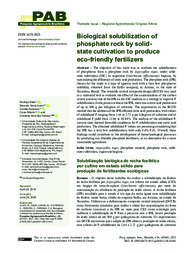Biological solubilization of phosphate rock by solidstate cultivation to produce eco-friendly fertilizers.
Biological solubilization of phosphate rock by solidstate cultivation to produce eco-friendly fertilizers.
Author(s): KLAIC, R.; GAVA JUNIOR, M.; RIBEIRO, C.; FARINAS, C. S.
Summary: The objective of this work was to evaluate the solubilization of phosphorus from a phosphate rock by Aspergillus niger, under solidstate cultivation (SSC) in sugarcane (Saccharum officinarum) bagasse, by maximizing the efficiency of citric acid production. The phosphate rock (IPR) chosen for the study is a type of igneous rock with a very low phosphorus solubility, obtained from the Itafós company, in Arraias, in the state of Tocantins, Brazil. The rotatable central composite design (RCCD) was used as a statistical tool to evaluate the effect of the concentrations of the carbon source (sucrose) and of the IPR on the SSC medium as a strategy to improve P solubilization. In the process without the IPR, there was a citric acid production of up to 300 g per kilogram of substrate. The experiments in the RCCD showed that the addition of the IPR affected citric acid production, with values of solubilized P ranging from 1.44 to 2.72 g per kilogram of substrate and of solubilized P yield from 12.96 to 48.94%. The analysis of the solubilized P/ sucrose ratio showed favorable conditions for P solubilization and citric acid production. The obtained solubilized P values are promising considering that the IPR has a very low solubilization, with only 8.6% P2O5. Overall, these findings could contribute to the development of biotechnological processes for producing eco-friendly phosphate fertilizers, as an alternative for a more sustainable agriculture
Publication year: 2021
Types of publication: Journal article
Unit: Embrapa Instrumentation
Keywords: Phosphate mineral, Phosphate rock, Solid-state cultivation
Observation
Some of Embrapa's publications are published as ePub files. To read them, use or download one of the following free software options to your computer or mobile device. Android: Google Play Books; IOS: iBooks; Windows and Linux: Calibre.
Access other publications
Access the Agricultural Research Database (BDPA) to consult Embrapa's full library collection and records.
Visit Embrapa Bookstore to purchase books and other publications sold by Embrapa.

